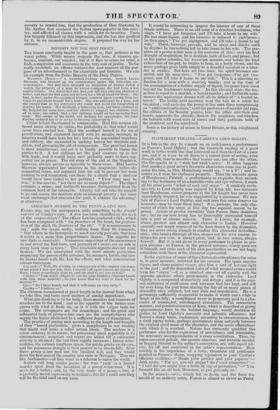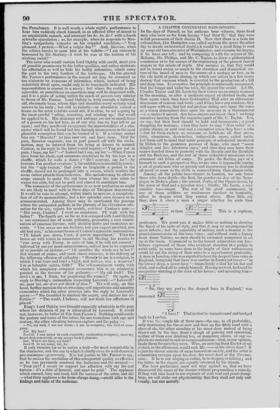HAYMARKET THEATRE.--FARREN'S LORD OGLEBY.
IT is late in the day to remark on so well-known a performance as Farren's Lord Ogleby ; but the twentieth reading of a good work is better worth the time bestowed on it than the first of a poor one, and it is wiser to sit down to a valued piece of acting, even though old, than to novelties that hasten out, one after the other, like the sparks in a " stale last week's news." It often happens that among a great actor's favourite characters some one in particular fits him, as Mrs. Heidelberg would say, "to a T " ; and becomes as it were his exclusive property. Thus the ancients speak of Henderson's Falstaff, a performance so exquisite, that, according to the testimony of an admirable critic and eye-witness, it made all his other parts "relish of sack and sugar." A similarly exclusive title to Lord Ogleby was enjoyed by King, till, less fortunate than Henderson, whose property in the fat knight has never been successfully disputed, he was supplanted by a successor. We now talk of Farren's Lord Ogleby, and well does this actor deserve his honours—may he wear them long ! It is, perhaps, the only character of which the stage at this day has especial reason to be proud. Actors of greater versatility than Farren there doubtless are ; but no one now living has so thoroughly insinuated himself into a part of classic renown. There is Liston, for example, whose greatest and almost only character is Liston. However carefully and deeply engraved be the lines drawn by the dramatist, they are never strong enough to confine this chartered latitudinarian; who breaks through all ties, shapes out his own course, indulges his own vein, is always great, and, in two senses, always himself. But it is not given to every performer to please in propria persona ; so Farren, in the present instance, wisely goes out of himself, and sinks such of his own peculiarities as are not haply
• coincident with those of the character represented.
To the existence of sonic of these fortunate coincidences the actor is, in great measure, indebted for his success. His spare angular figure, and sharp-pointed visage, give him a sort of natural right to the part ; and the discordant tones of what musical critics would term his "organ "—it is a cracked one—set off equally well the opposite qualities which predominate in the character. Lord Ogleby is a compound of causticity and dotage ; and it is the copious scattering of good sense and sarcasm that has kept, and will for ever keep, the part from sharing the fate of so many pieces of absurdity once relished, but now stale and unpalatable. He is a personage sufficiently respectable to make it worth one's while to laugh at his folly, a compliment never in perpetuity paid to a character of unmingled, unredeemed absurdities. The sententious manner, and pointed elocution of King, which is described as giving epigrammatic force to the baldest language, would doubtless do justice to Lord Ogleby's sarcastic and splenetic effusions ; but Farren's sharp tones, exchanged, according to circumstances, for
a shrill piping treble, perhaps discriminate more naturally between the original good sense of the character, and the senile affectations with which it is overlaid. Nature has eminently qualified this performer also for the expression of peevishness and irascibility, the necessary accompaniments of a crazy constitution. Thus, the superannuated gallant, the caustic observer, and irritable invalid, so happily blended in the author's conception, are, with equal felicity, hit off and combined in the actor's representation. How forcibly is the impatience of a testy, rheumatic old gentleman
painted in Farren's sharp, snapping rejoinders to poor Canton's officious civilities.—" Damn your powder and your papiers."— And, again, " For me, you old puppy ! do I want cosmetics "I tote dat you might take a leetic by vay of prevention!--" You thought like an old fool, Monsieur, as you generally do."
In the remarks aside, which fall so feeble and flat from the mouth of an ordinary actor, Farren is almost as clever as Yerlet
the Frenchman. It is well worth a whole night's performance to hear him suddenly check himself, in an affected titter of assent to
an unpalatable remark, and interrupt his he, he, he !. with a harsh
splenetic ejaculation ; as, for example, when he responds to Sterling's sympathetic remarks on his crippled condition,—" Very pleasant, I protest. —What a vulgar dog ! " And, likewise, when the citizen breaks in upon him at his toilette—" I am extremely honoured by Mr. Sterling—I wish he was at the bottom of his stinking canal !" The actor who would sustain Lord Ogleby with credit, must give all possible prominency to his better qualities, and rather moderate his affectation as well as hide his bodily infirmities, which carry the part to the very borders of the burlesque. On this ground Mr. Farren's performance in the second act may be censured as too elaborate an exposure of infirmities, which, instead of being sedulously dwelt upon, ought only to be transiently indicated. His representation is correct to a nicety ; but where the reality is disagreeable, so punctilious an exactness may well be dispensed with, and it is a piece of acting within the reach of powers very inferior to those of Mr. Farren. Lord Ogleby is, truly enough, a battered, old, rheumatic beau, whose hips and shoulders every easterly wind screws to his body ; but still so ricketty—so absolutely ruined a
frame as the actor exhibits could not, it is clear, be set a-going by the most careful "oiling, screwing, and winding up," that could be applied to it. His shakings and sinkings are not so much those of a person on his last legs, as of one who has no legs left to go upon ; and they needlessly exaggerate the improbabilities of a character which will be found but too daringly incongruous in the most .plausible conception that can be formed of it. If a twinge makes him cry " Diavolo !" let him roar out, and have done. That the pain, however exquisite, has in part passed off with the exclamation, may be inferred from his being at leisure to mimick Canton, in his reply to the lattee's civil inquiry—" You are not in pain, I hope, my lor ?"—" Indeed but I am, my lor."—When Farren rises from his chair, and summons resolution to try his legs in a shuffle, which he calls a dance ( " He ! courage, my lor !—by heavens I'm another creature."), the exhibition is irresistibly comic ; but the " ugly twinge," that puts so laughable a period to the shuffle, should not be prolonged into a swoon, which renders the scene rather pitiable than ludicrous. His maladies may be allowed scope enough to make the old beau change his note when he waxes too elate, but not to quell and almost to annihilate him. The remainder of the performance is as near perfection as aught we are likely to meet with in these days of Thespian degeneracy. It would be vain to attempt, within limits so narrow, a recapitulation of all its memorabilia ; but a few splendid ones deserve to be commemorated. Among these may be mentioned the passage where the antiquated gallant, in the phrenzy of his chivalrous adoration for the sex, rejects his crutch, videlicet Canton's arm :— " Get away, Canton ! I want no assistance. PH walk with the ladies !" The fourth act, so far as it is occupied with Lord Ogleby, is one continued fire of senile gallantry, presenting a rare combination of amorous fervour, with shaking limbs and tremulous accents. "You never see me badiner, but you expect mischief, you old fool you," is his retort to one of Canton's agreeable insinuations. "I'll knock you down, Cant, if you're impertinent." Then the brave air with which he announces to old Sterling his resolve to "run away with Fanny, in spite of him, if he will not consent," followed by one yet more magnanimous, and yet less to be expected of so juvenile an idolater,—" I'll sacrifice the whole sex to her !" But beyond all praise, and great above measure, is his delivery of the following effusion of gallantry : "Beauty to me is a religion, in which I was born and bred a bigot, and would DIE A MARTYR!
I'm in tolerable spirits, faith The self-complacent vanity with which his imaginary conquest overcomes him is as admirably painted as the fervour of his gallantry :—" My old fault! The devil's in me, I think, for perplexing the women!" Or again, in reply to Sterling's insinuation respecting Lovewell :—" Lovewell! no, poor lad, she does not think of hint !" We will only, on this head, further mention the overweening self-importance and amazing coxcombry which the actor conveys into the reply to Loyeavell's query :—" She trembled to disclose the secret, and declare her affection ?" "The world, I believe, will not think her affections ill placed."
King's Lord Ogleby was thought especially admirable in the part where his delirium of joy is interrupted by Lovewell. It could not, however, be better in this than Farren's. Nothing could outdo the gesture and tones of the latter, the one tremulous with age and ecstacy, the other vibrating between rapture and the palsy :—
—No, my lord, I am not alone ; I am in company, the best of company. Lov. My lord
Lord O. I was never in such exquisite, enchanting company, since my heart first conceived, or my senses tasted pleasure.
Loy. Where are they, my lord ?
Lard 0. In my mind, Sir, 84c.
It only remains for us to notice a trait—the most remarkable in the character, and the one to which it chiefly owes its well-deserved pre-eminence—generosity. It is but justice to Mr. Farren to say, that he makes the revelation of this unexpected quality as effective as he has previously rendered the ludicrous and the ironical :— " Poor girl! I swore to support her affection with my life and
fortune : a debt of honour, and must be paid." The applause which ensued, long and loud, told the success of the actor, and did —what their applause is far from always doing,—credit alike to the feelings and taste of the audience.



















 Previous page
Previous page